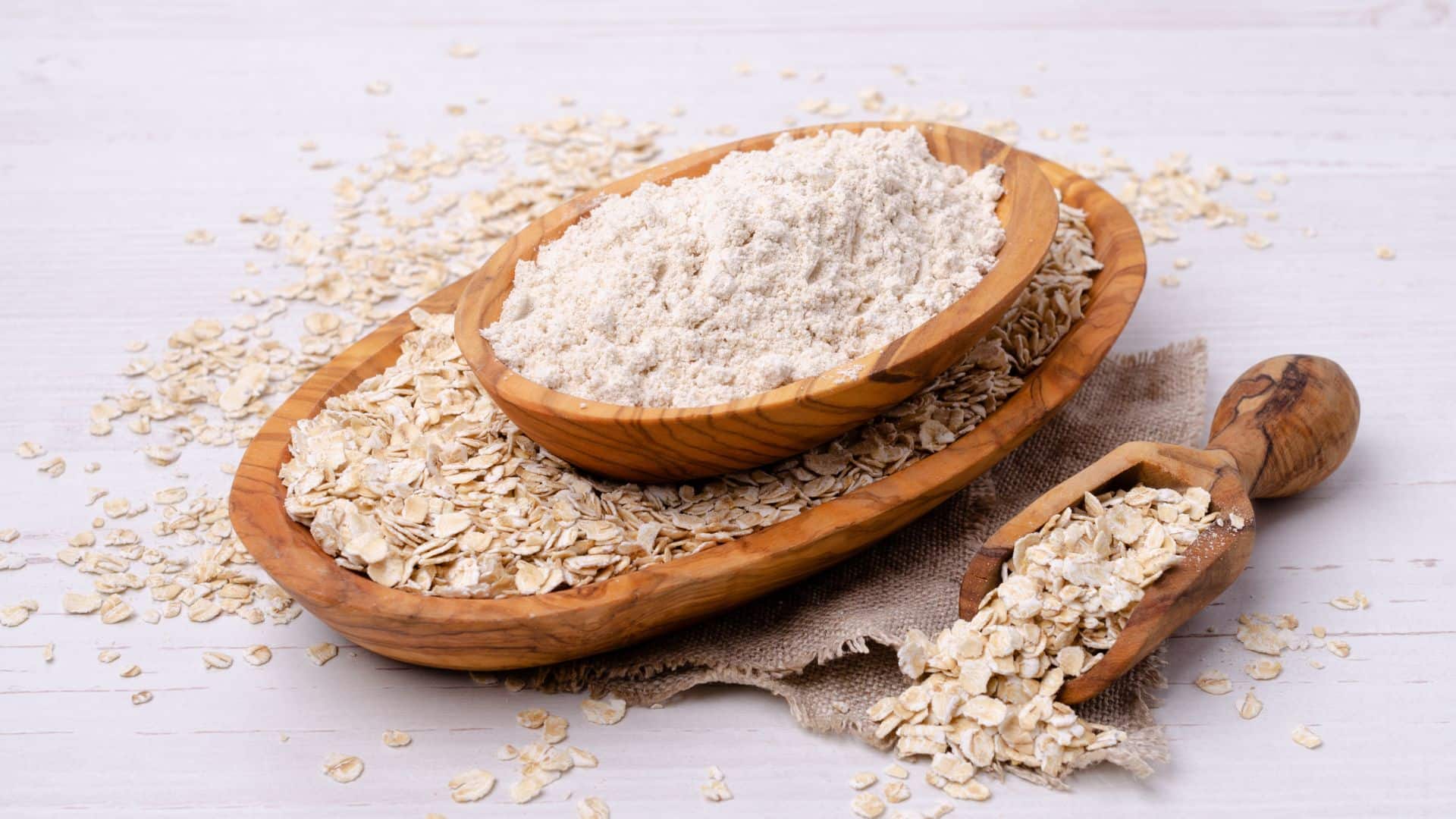Here’s the short: yes, oat flour is worth the hype! Keep reading to find out more about oat flour benefits.
This article will cover:
- Oat flour nutrition
- Is oat flour gluten-free?
- Oat flour vs. almond flour
- Oat flour vs. coconut flour
- Is oat flour healthy?
- Do oats boost metabolism?
- Are oats good for hormone balance?
- Are oats good for the immune system?
Let’s dive in!
Oat Flour Nutrition
Oat flour is a nice alternative to wheat flour or white flour. Oat flour is rolled oats ground into flour. It’s a whole grain, whole food, and contains all parts of the whole oat seed.
Oats, Avena sativa, are primarily considered a complex carbohydrate but also contain small amounts of protein and fat. They are high in fiber, a nutrient most of us need more of. Most of the fiber is soluble fiber, which provides many health benefits attributed to oats, including blood sugar and heart health support.
Oats are also a good source of vitamins (primarily vitamin B1), minerals (calcium, iron, magnesium, selenium, and more), and bioactive compounds (including antioxidants).
Is Oat Flour Gluten Free?
Oats are a gluten-free grain; they don’t inherently contain any gluten proteins. However, commercial oats are often contaminated with gluten mainly because of shared harvesting, storage, and packaging equipment.
For gluten-sensitive people, it’s important to choose certified gluten-free oat flour to avoid contamination.
Oat Flour Vs. Almond Flour: Flavor and Texture
Oat flour is a popular, versatile flour used in gluten-free baking. Baking with oat flour produces baked goods with a mild flavor and refined texture.
Almond flour is another popular flour used in gluten-free baking and protein balls. Almond flour is higher in protein but has a coarser texture and nuttier flavor.
Oat Flour Vs. Coconut Flour: Flavor and Texture
Coconut flour is another popular gluten-free flour. Coconut flour is made by removing the fat from coconut meat. It produces a dense texture and coconut flavor.
Possible Oat Flour Health Benefits - Are Oats Good For:
Beta-glucans are a soluble fiber found in whole oats and oat flour, which help stabilize blood sugar levels, lower cholesterol, support gut health, and more. Many of the health benefits attributed to including oats in your diet are attributed to the nutritional content of oats, including beta-glucans.
Boosting Your Metabolism
Carbs provide energy, and fiber helps produce satiety, a sense of fullness. The high fiber content of carbs helps slow the release of sugar into the bloodstream, boosting metabolism and stabilizing energy.
Weight Loss
Many health experts recommend oats for weight loss. Oats help stabilize blood sugar, produce satiety, and support digestive health, all contributing to a healthy metabolism. Beta-glucans are a prebiotic, meaning they provide a food source for beneficial bacteria in the gut. Shifting bacterial balance is one way to support metabolic health and weight loss.
Hormone Balance
All hormone systems are connected. Balancing blood sugar and the hormone insulin may help to balance thyroid, adrenal, and reproductive hormones. In addition, the fiber in oats helps remove metabolized estrogen from the body.
Immune System Booster
Beta-glucans are also an immune system booster. Most of the immune system is in the gut, and this fiber interacts with the microbiome and gut-associated immune tissue. Research suggests beta-glucans help enhance and balance the immune system and reduce susceptibility to infections.
Oat Flour and Blood Sugar Levels
Glycemic load is a tool to help explain how quickly a serving of carbohydrate food (like oats) will raise blood sugar levels. Because oat flour is a whole grain and fiber-rich, it has a lower glycemic load than many other baking flours.
One downside of glycemic load is that it doesn’t account for the fact that we eat mixed meals. Adding protein and healthy fat to your oat flour, as seen in Scott’s Protein Balls, helps reduce the blood sugar response even more.
What is the glycemic level of oat flour?
Oat flour, derived from finely ground oats, is known for its moderate glycemic index (GI) compared to all-purpose flour and other grain-based options. With a GI typically ranging between 44 and 55, oats flour has a low to medium glycemic index, meaning it causes a slower rise in blood glucose levels compared to high glycemic index alternatives like corn flour or potato flour. This moderate glycemic response is due to the fiber content, especially oat bran, which helps stabilize blood sugar levels and improve insulin sensitivity. Compared to refined flour like regular all-purpose flour, which can spike glucose quickly, oat flour offers a more balanced option. Its GI is lower than bread made from white flour but slightly higher than steel-cut oats or overnight oats. When compared to other flours like brown rice flour, buckwheat flour, or spelt flour, oat flour stands out for its combination of moderate GI, fiber, and versatility, making it a healthier choice for baking cookies, pancakes, and more, while supporting better overall blood sugar control.
Glycemic Level of Oat Flour: Key Points
-
Glycemic Index (GI): Oat flour has a low to moderate GI, ranging between 44 and 55.
Compared to Other Flours: Its GI is lower than all-purpose flour, corn flour, and potato flour, but slightly higher than steel-cut oats or overnight oats. -
Blood Sugar Control: The fiber in oat flour, particularly oat bran, helps stabilize blood glucose levels and improve insulin sensitivity.
Nutritional Benefits: Oat flour is rich in fiber, contains some healthy fat, and supports a more gradual glycemic response. -
Versatility: It’s an excellent alternative to refined flour for making cookies, pancakes, and other baked goods.
FAQs
- How does oat flour compare to all-purpose flour in glycemic index?
Oat flour has a lower glycemic index (44–55) than all-purpose flour, which has a GI of about 85. This means oat flour is less likely to cause rapid spikes in blood sugar levels. - Is oat flour suitable for people with diabetes?
Yes, oat flour’s low to moderate glycemic index and fiber content make it a good choice for people looking to manage blood glucose levels. However, portion control is still important. - Can oat flour be substituted for other flours in baking?
Oat flour can replace all-purpose flour or grain flours like buckwheat flour or spelt flour in many recipes. However, its lack of gluten may affect the texture of some baked goods unless combined with other flours or binding agents.
Cinnamon Lowers Glycemic Load of Baked Goods
Many baked goods contain oats and cinnamon, and not just for the delicious flavor. Including cinnamon in baked goods, meals, and snacks helps improve blood sugar balance.
Here at Scott’s, every ingredient has a purpose. We use oat flour in our protein ball recipes for the flavor, texture, and health benefits described here. We use high-quality, certified gluten-free oats to make oat flour and combine it with plant proteins and healthy fat. You’ll even find cinnamon in our Snickerdoodle protein balls and our new Cinnamon Bun protein balls. The result is delicious, balanced snacks to fuel your active, healthy lifestyle.






